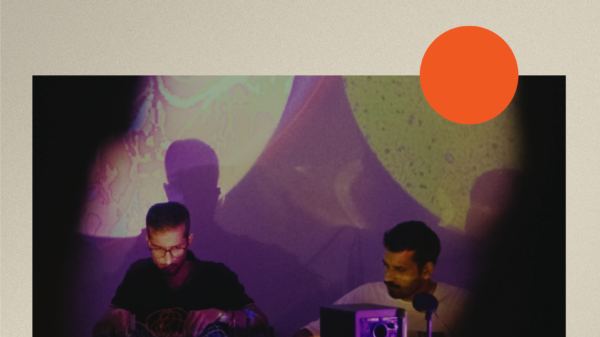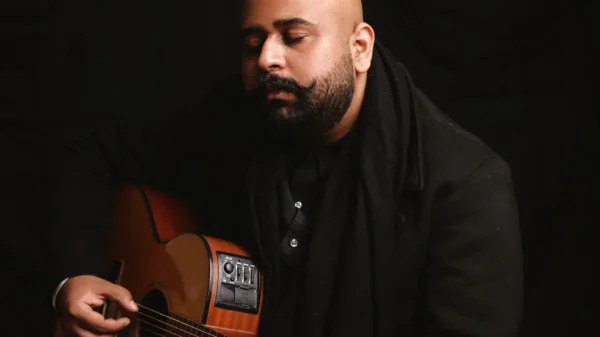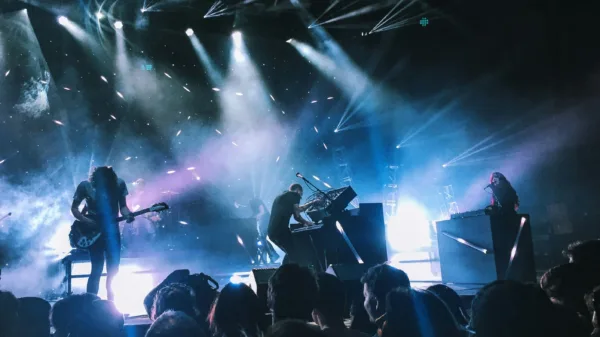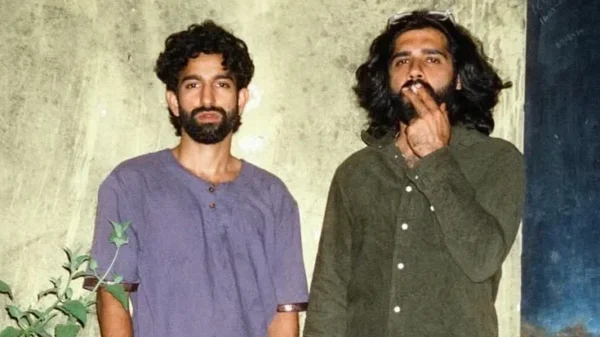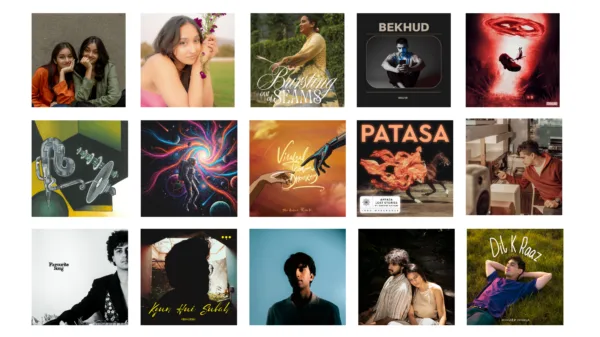Varun and Rengan (also referred to as Ren throughout the length of this interview) are unabashedly honest. Going by the artist monikers of 14thindian and nerdyrengan., the duo compose the artist outfit bunnyboo and have debuted their mixtape, “Shall We Proceed?” 8 Selected Oddities From The Hut — as a sequel to their 2023 EP, As We Proceed, into the ontologically un-surmisable topography of the Indian-rapscape – perhaps with a refreshing, welcome fervor, some substance.
Over a G-meet call that moves in an untethered progression of sorts, Varun tells me that their first EP, which is around the time when they started working together – “had a bunch of connotations to itself, like Kendrick Lamar used in his Grammy performance. We wanted to bring abstract hip-hop to Kerala, it was not really being done as much – and that was the whole idea. We knew that we wanted to bring a new sound, and we wanted to ask the question of how we proceeded. The last song on that album was called Bunny Boo/Curtain Call and Bunny Boo is about this character who, due to his financial problems, goes and robs a bank — and there are a bunch of questions asked because of that. It was really funny, rolled off the tongue really well – and was really tongue-in-cheek. Shall We Proceed? was kind of everything after that.”
Beginnings of All Proceedings, or How Did We Get Here?
Somewhere around early 2024, through the grapevine of whispers of Indian independent music release informants, I had heard of and listened to the duo’s second composite release together – Payyan Kathakal, which was an avant-garde “concept EP” that combined sounds from heavy metal, jazz, and Indian fusion. This record, over time, has accumulated a niche, cult-like horde of appreciators amongst the curators of taste within the indie space. However, the two wanted to go back – return to their roots. “We wanted to find something a little more accessible. We need to convey this point to a larger crowd of people,” Varun continues, “And then, we thought that this sounds quite similar to As We Proceed. As We Proceed uses a bunch of sounds from Ethiopia, Indian soul and funk samples – that was an incredible experience. We thought we should go back to that sound, and let’s see how far we can push it still.” As We Proceed, Rengan interjects, was “a 10-minute EP. It was six songs, very short songs, and Shall We Proceed deals with fleshing that idea out into a larger canvas – and pushing it further. That is why we decided to call it Shall We Proceed, as a homage to that project.”
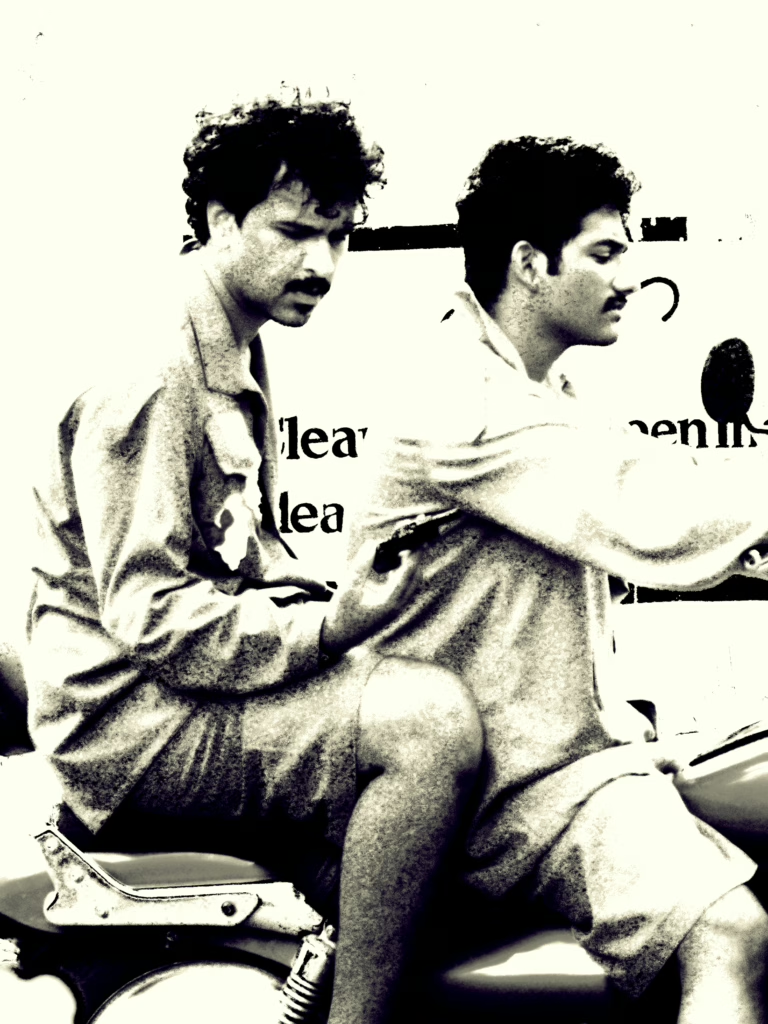
The first beat came around in April or May of 2024, which ended up being the first track BunnyBoo Live! This project also took the duo a lot more time than it usually does, for them. The first EP had taken them a whopping four days, Payyan Kathakal a few months – but Shall We Proceed managed to stretch itself out into an entire year. The writing had gone through numerous rewrites – the duo had not relinquished their product to their first draft.
Their relationship to the album changed, overtime, as the duo initially wanted the politics of it to be abrasive, and stand out in the forefront. “Then in real-time, we realized that these politics have consequences and so did the sound of the album evolve”, says Varun – before Rengan completes that train of thought – “We both really appreciate, in retrospect, the timeline we picked to complete the album. There was a whole character arc within ourselves with how we approached the music. That is kind of reflected in the tracklist – how the album is paced or even sequenced. It starts off on a very abrasive note – with Bunny Boo Live! or BUFF CURRY. It is all braggadocious, and whatever we had to say is very in-your-face. If we were to say that both of us are that confident with our thoughts or what we are saying, we would be lying. There are a lot of insecurities that come with us not being artists, or even having any sort of platform to say the things we are saying. We need to be always aware of who we are and what privileges we carry, the things we have and don’t have. The time period gave us the chance to reflect on everything – the politics and how it is personal to us. We don’t usually write a lot of personal stuff – but it is there, on songs like insides and Franzie — which sometimes embarasses us. We usually hide behind the veil of fiction when we write. Like he said, BunnyBoo is a character. We usually write with characters. This time, it is honestly us — for better or for worse.”
The duo are separated by thousands of miles between them, with Rengan being based in Kochi – and Varun in Raebareli. On asking how they met, their initial response is Grindr — but a more factual, and long-winded account is that they met on Twitter during the pandemic. The former mentions, “I didn’t know he was this young – I’m four years older than him. I saw him talking about music that nobody around me was listening to. I listened to it, but I had nobody to speak to about it. We just spoke on the timeline – and then later, we found each others’ work. He was still showing stuff, and making films.”
Varun saw Rengan at a screening of one of his films in Kochi, and they hit it off ever since. The latter was in the process of making a full-length feature film Watusi Zombie! and he recalls the other sending him an instrumental chopped on DaVinci Resolve, owing to his then unfamiliarity to DAWs. “I thought it was really cool. And I told him that bro you should make an EP, we should do something and he took it seriously. So he sent me 40-50 beats, and I could not check, because I was caught in the hellfire of shooting. I felt so bad, because this kid was sending me so many beats — and I could not check.” He had liked the beats the moment he had heard them, and this had rolled over into them making As We Proceed.
During the entire creative process, they met only “once or twice.” Varun usually flies out to meet the former – “It is usually a very gruelling three or four days when we film two or three music videos, pack all of our shoots within that time. I don’t think I have ever met this man when it is not work. Rengan points out, “He’s never seen me in normal clothes — the time frame is so limited. We started off as filmmakers, we still are filmmakers. We loved music all the while – but we don’t know sh*t about making music. For the first project, it was just us learning how to make music — like, oh, you can do that. But we do take pride in what we shoot. ”
The two have an intriguing, polished visual language — interweaving distinct surrealism with gangster kitsch and aesthetics derived from multiple genres of Malayalam cinema. The duo had guerilla shot the music videos, gone through run-ins with cops which Varun had amusingly misinterpreted because of his “poor” Malayalam, and worked through Ren’s initial skepticism towards the garments picked for them. The project is a collaborative one, born out of the efforts of the community of artists that they work in – with Cyril Abraham doing the cover art, the two working on the videos along with Priyam, and costumes from Deeksha Daniel and silaayiwaliii, and their many featured artists who manage to carry the narrative forward while remaining coherent with the vision of the album.
The Sonics
The duo engage in an almost manic, archival form of hypersampling on the mixtape. They have taken snippets from music, reels, movies [“Illaiyaraja look away, there is nothing to see here.”]. Varun attributes some of his resilient reliance on sampling as laziness, however – he has replicated from a Erykah Badu single, and talks about them with the precise animation of someone who knows what he is doing and uses them to signal the direction of thought towards the central motivations he wants to be communicated. A few other interesting ones he points to, are an extract of what Pawan Kalyan has said from a specific interview, where he is asked why he did not create another Lollypop Lagelu — which he thinks is an incredibly potent question, considering the status that the song has achieved – and the chords used on insides being the same as Lingua Ignota’s I WHO BEND TALL GRASSES from the SINNER GET READY album. He also takes from a video of a racist tirade from a mall in Warsaw levied at an Indian man who is one half of an interracial relationship – “you gonna mix your genetics with this sh*tskin”, cutting across the recitation into the body of the very real. The duo balance each other out, because while Varun has an affinity towards a constant undercutting of their music-making endeavor, Rengan – perhaps in his 4 year headstart at wisdom, subtly brandishes it to the side.
One of the most distinct pieces of music on the project – is the outro to the title track. The instrumental divides the project into almost two halves – functionally almost an interlude. The beat, Rengan reveals, was not meant for either of them to rap on — and he found it difficult to rap around. One night, however, something very personal came out of him, “My anxieties almost took shape on that beat. I don’t know how I rapped over that. I don’t know how that song came to me. I don’t know how it is the way it is, but it just is. I love it, it’s probably one of my most favorite instrumentals on the album.”
Varun, who has been gearing up to comment, snickers, “Do you know how I made that instrumental? It’s a sample.”
And The Geographies
The album is spatial in its sonics. The duo wax poetic about Raebareli, and Varun’s entwining with the place is deep, as he feels that he has been changed by his four year stay there — “I find the place very poetic in the way that it was pushed to the sidelines after Independence”, with the city getting the “bottom half of the stick” in terms of its neighboring cities. Rengan, who has never been to Raebareli, will go there in a month or two for the first time, “I feel so connected to the place because I have worked with him so much. Even certain textures — I have seen how he has changed, how his filmmaking has changed, because he does everything too. He is the cinematographer, he does the edits and colorgrading too. It’s very singular in that way, there has been an obvious shift from what he was making when he was at home, and how he makes things there. The textures have changed, things are warmer. That is why I want to go there, to experience it.”
Traveling, according to Varun – who moves around the most out of the two, forms a core aspect of the project [“we’re pan-Indian, like Prabhas!], “We had Wayanad, Palakkad, Kochi, Mumbai, Pune, Lucknow, Delhi, Benaras – all these places. I am recording sounds and samples in all these places.” The locations have added to the texture of the sound of the album, shaped them in diverse ways — traveling has pulled them out of ruts and made them more dynamic. When I ask them if the difference in their respective approaches to movement, and life in general— with Varun being pro-pushing himself around and Ren relegating himself more to time at home and reading — the former answers in the affirmative, “I think in a lot of ways we are polar opposites. He takes time with his work, and me – I cannot sit idle. I need to be creative otherwise I will lose it, I feel like I am not good enough. I think it provides a great balance – then we can just stock on the surplus I keep providing, the residuals of the music we put out.”
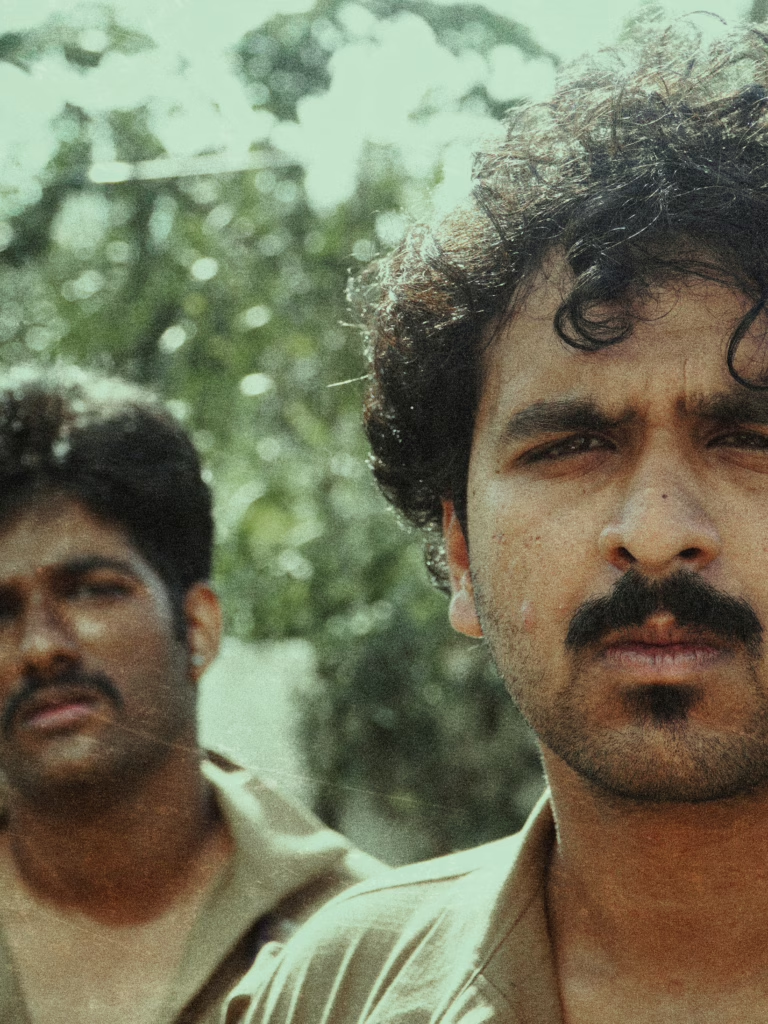
Ren agrees, “He doesn’t just send me the beat, most of the time, he also sends me the verse. I take my time. It just comes out of me, at times. But, say, the Shall We Proceed thing, I wrote that in 20 minutes, but the beat had been with me for 2 months. I would occasionally listen, I would imagine the content of the other rapper coming in on that, the direction we would have requested them — we are all aware of that. Even insides, he had sent me his verse and the hook — and I immediately knew what I was going to write when I heard it, but it took me a lot of time to put it to paper as good as my skills would allow me to. But I enjoy thinking about it, I enjoy taking my time. I don’t like my first drafts, at all – most of the time, it is just me eliminating the sh*t out. It is a great balance – the one thing we do share is a work ethic, we both understand what needs to be done. There is no hesitation there – we will jump in front of cars and rap in front of windshields, we will roll around mud. That is what keeps us together.”
Procedural Politics and Other Porous Lines
The politics of this record are apparent, cue titles like BUFF CURRY and They sold Ayodhya for a pack of Lights. The duo have contemplated leaving a lot of things in the archives, as Varun states, “I wish that caution had been there previously, with songs like Ayodhya, because I know I am putting myself and the people I care about at risk. The video did turn a few heads, I mean I don’t know how long we can take these risks now that there are some eyes on us, I don’t know if people expect us to take the same risks as before. I think there is a smarter way to go about things. I often think of using the idea of subtext rather than shoving these things down people’s throats.” A question that had struck me, was how they had managed to toe the thin line between maintaining a critique of colonialism while not falling into the death-trap of inching towards hyper-nationalism or anything along similar lines, Varun is expansive in outlook – “It is a very porous line, between nationalism and hypernationalism — and I don’t think we can reckon nationalism as nationalism. However, I think we need to know our place, the urge to want a better version of our country should not erase the degree of damage that the colonial forces did to our country. The colonial forces did bring in certain ideas and systems. I do not see it as being hyper-nationalistic, to call out the forces that not just stopped us from having progress but stop us today as well and see us as people who do not proceed. You need to hear out the whole argument — it’s us as a people, it’s not us as a state, it’s not us as the powers that control us as a state. You think about the Godse-fication of India, as Ravish Kumar speaks about it, and you wonder about the right being so provocative — and where does one go from there? I often think of this from an anti-Zionistic perspective — what do you do when you have a gargantuan, Herculean power that is behind you ruining everything when you have everything to lose? How do you proceed in a country like that? I think we as people need to listen to other people, to the entire argument. I see the line as so incredibly porous, and it can be so easily misunderstood.” Ren adds, “I think one way would be to consume the literature that surrounds all this. For me, personally, over the course year, I went back to a lot of Franz Fanon. That has changed how I even consume Palestinian literature, or everything that comes out of conflict and conflict resistance. It goes back to post colonial literature, the reason why many African writers stopped writing in their mother tongue was to show the larger world in spite of resistance of their countrymen that while English as a language has been brought to the colonial world, and that is the main language we communicate in – but it is the very same language that they are using to paint our land as a backward one. For the world at large to know, we need to speak in their language at times – to fight fire with fire. I personally do take pride in speaking in every language I know in my music and present tales in that language, be that in Payyan Kathakal or Shall We Proceed?”
Literature, Ren believes, builds empathy – and transcends media, in the midst of all the monitoring and control in contemporary times, “Nothing is yours, honestly. All you have is the written word at the end of the day. In order to pursue real empathy, in order to understand cultures, people, you need to consume art.”
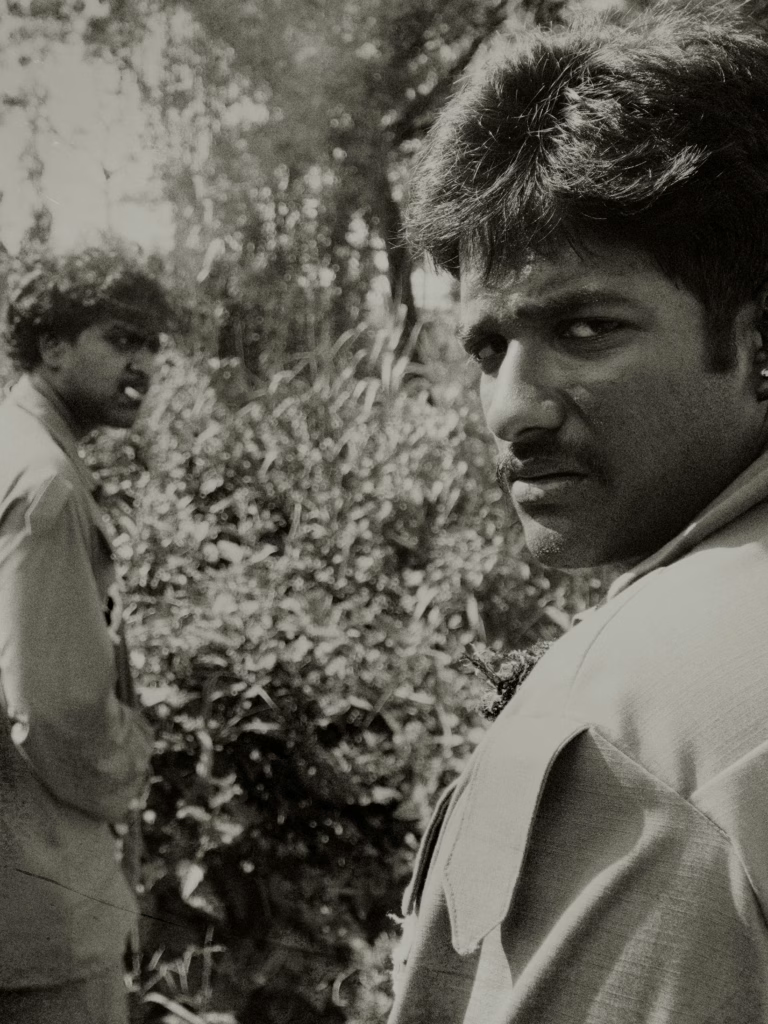
When I ask if the duo have feared backlash because of the content of their work, Varun responds with a striking, impressive self-knowledge, “Again, it’s radicalism in a lot of ways — as an artist you are being radical. A sacrifice is one thing, but the implications and the aftermath of the sacrifice is another. When Aaron Bushnell went, it was a terrible loss – but then what? How do we get away from this, how do we move ahead of this? Am I so much of a radical that I think the right needs to die? No, absolutely not. I don’t think anyone believes that. I think we have to come to an understanding of empathy. We were extremely scared, and we even put out a statement before the release of the album … I know I am walking a very thin line, but I also hope this is a very youthful rage that as time goes on, there will be someone else to pass the torch to, so that there is a way to genuinely express this that is not reliant on violent or extreme means, but something that is rooted in love.”
***
As we wrap our G-Meet call up, Ren points out that nobody has asked him his top 5 albums – a question that he has been prepared for for ages. When I ask him to name the same, it takes him a little more time than someone who allegedly has a Google Doc as ammunition. They are as follows : Atrocity Exhibition (Danny Brown), To Pimp A Butterfly (Kendrick Lamar), The Black Saint and The Sinner Lady (Charles Mingus), Songs in the Key of the Life (Stevie Wonder) and Promises (Floating Points, Pharoah Sanders, London Symphony Orchestra).






